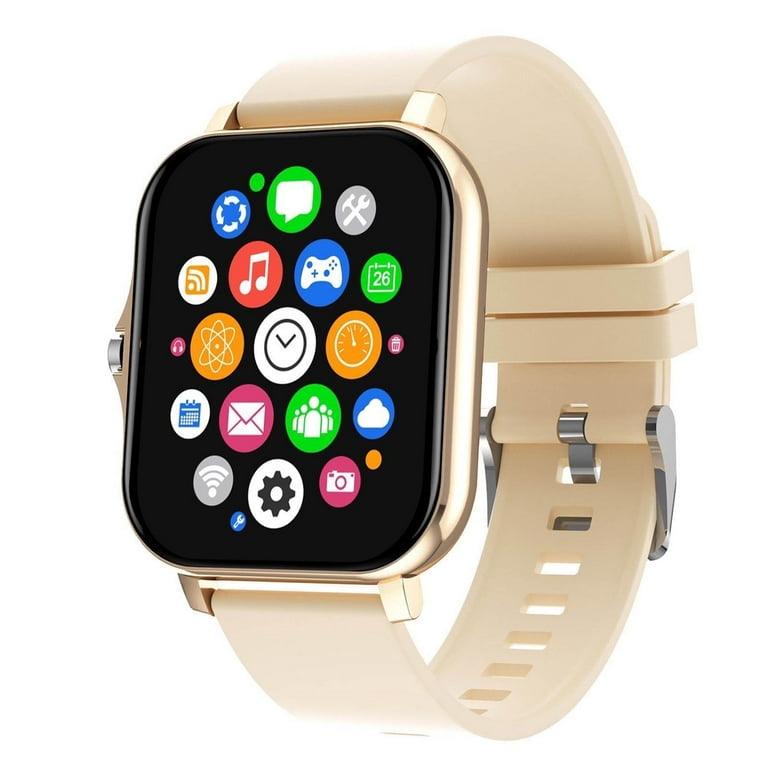How Does a Smartwatch Use Ai?
Imagine having a personal assistant strapped to your wrist, ready to help you navigate through your busy day. That’s what a smartwatch powered by AI can do for you.
You might wonder how this sleek gadget anticipates your needs, tracks your health, or even gives you reminders at just the right moment. If you’re curious about how AI transforms a simple watch into a smart companion, you’re in the right place.
This article will unveil the magic behind your smartwatch, showing you how AI makes it more efficient and personalized. Discover the secrets of your device that can potentially enhance your daily life, and learn why it’s not just a watch, but a smart powerhouse that keeps you connected and informed. Dive in, and unlock the potential of your wearable technology!
Ai Integration In Smartwatches
AI integration in smartwatches has transformed the way we interact with technology. These wearable devices now offer more than just timekeeping and notifications. With AI, smartwatches have become personal assistants. They learn from user behavior and enhance functionality. AI helps in understanding user preferences and adapting to them. This makes smartwatches more intuitive and efficient.
Ai-powered Health Tracking
Smartwatches use AI to monitor health metrics accurately. They track heart rate, sleep patterns, and physical activity. AI algorithms analyze this data to provide health insights. This helps users make informed decisions about their well-being. AI can detect irregular heartbeats and notify users. This feature acts as a proactive health monitor.
Voice Recognition And Virtual Assistance
AI enables voice recognition in smartwatches. Users can interact with their device using voice commands. This makes daily tasks easier and hands-free. AI-driven virtual assistants provide quick answers. They help manage schedules and set reminders. These assistants understand natural language and offer personalized responses.
Personalized Recommendations
Smartwatches use AI to offer personalized recommendations. They learn user habits and preferences over time. AI suggests suitable apps and features based on usage patterns. This personalization enhances the user experience. AI adapts to changing user needs and preferences seamlessly.
Enhanced Battery Management
AI contributes to efficient battery management in smartwatches. It optimizes power consumption based on user activity. AI predicts usage patterns and adjusts settings accordingly. This ensures longer battery life without compromising features. Users enjoy extended use with minimal charging interruptions.
Health Monitoring
Smartwatches have transformed how we monitor our health. They use AI to provide real-time insights. This technology helps in tracking various health metrics effortlessly. Here are some ways AI enhances health monitoring in smartwatches.
Heart Rate Analysis
Smartwatches constantly track your heart rate. AI analyzes this data to detect irregular patterns. It alerts users about potential heart issues. This proactive approach aids in early diagnosis. It offers peace of mind and promotes heart health.
Sleep Tracking
AI-powered smartwatches monitor your sleep patterns. They track sleep stages like light, deep, and REM sleep. This data helps improve sleep quality. Users receive insights on how to sleep better. It encourages healthier sleep habits.
Fitness Recommendations
Based on activity data, AI provides fitness suggestions. It recommends workouts tailored to your goals. These insights help improve physical health. It motivates users to stay active. AI makes fitness tracking more personalized.
Voice Assistants
Smartwatches use AI to enhance user experience through voice assistants. They help set reminders and answer questions. AI processes spoken commands, making tasks like sending messages easier and hands-free. These features improve daily routines efficiently.
Voice assistants in smartwatches are changing daily life. They help users perform tasks easily and efficiently. These assistants use AI to understand and respond to commands. They make smartwatches more interactive and useful.Speech Recognition
Speech recognition is a key feature of voice assistants. It allows the device to understand spoken words. Users can give commands without pressing buttons. The smartwatch listens and processes speech using AI algorithms. This feature makes performing tasks more convenient. It also improves accessibility for users with disabilities.Personalized Responses
Personalized responses enhance user experience. Voice assistants learn from interactions. They tailor responses based on user habits. Smartwatches with AI can suggest actions or reminders. These suggestions are based on past behavior. Personalized responses make smartwatches more intuitive. They provide helpful information that matches individual needs.
Credit: www.youtube.com
Activity Tracking
Smartwatches have transformed how we monitor our daily activities. With AI, they offer precise activity tracking. This feature helps users maintain health and fitness goals. Understanding how AI enables this tracking is crucial. Let’s delve into two core aspects: step counting algorithms and pattern recognition.
Step Counting Algorithms
Smartwatches utilize advanced step counting algorithms. These algorithms analyze movements to calculate steps taken. They differentiate between walking and other activities. This ensures accurate step counts. AI constantly improves these algorithms. It learns from user patterns for better precision.
Pattern Recognition
AI in smartwatches excels at pattern recognition. It identifies daily activity habits. This includes walking, running, or cycling. Recognizing these patterns helps in personalizing health insights. AI adapts to changes in routines. It provides tailored feedback, enhancing user experience.
User Experience Enhancement
Smartwatches are more than just timekeepers. They integrate AI to enhance user experiences. These devices aim to make interactions intuitive and efficient. Every feature focuses on user comfort and ease of use. AI plays a crucial role in this transformation.
Predictive Text Input
Predictive text input simplifies typing on small screens. AI learns from your typing habits. It suggests words and phrases you use often. This reduces typing time and improves accuracy. The more you type, the smarter it gets. It adapts to your unique style.
Gesture Control
Gesture control offers a hands-free experience. AI detects and interprets your hand movements. You can navigate through apps with simple gestures. This feature is helpful during workouts or when your hands are busy. It makes smartwatch use effortless and seamless.
Battery Optimization
Smartwatches enhance battery optimization using AI. They analyze usage patterns, adjusting settings to conserve power. AI predicts user habits, ensuring efficient energy use while maintaining performance.
Battery optimization is a crucial aspect of smartwatch functionality, especially with the addition of AI. It ensures your device runs efficiently, prolonging the time between charges. This extends convenience and enhances user experience. Smartwatches, like other smart devices, continuously strive to balance performance and battery life. AI plays a significant role in making this balance more effective. A few months ago, I found myself constantly charging my smartwatch. I soon realized that AI features could help manage battery usage more smartly. Let’s dive into how this works.Adaptive Power Management
AI in smartwatches uses adaptive power management to optimize battery life. This means your device learns from your usage patterns. It identifies when you typically use certain features and adjusts power allocation accordingly. Imagine your smartwatch notices you check notifications mostly in the morning. It will prioritize power for that time, conserving energy when not needed. This smart allocation keeps your device running longer without extra charging sessions. Have you ever wondered if your smartwatch could predict when you’re about to run out of battery? With AI, it can. By analyzing your daily habits, it can suggest power-saving tips before you even realize you need them. The beauty of adaptive power management lies in its subtlety. You’ll experience improved battery life without even noticing the intricate adjustments happening behind the scenes. It’s a seamless integration into your daily routine. How has your experience been with smartwatch battery life? Have you noticed improvements since AI became a part of your wearable tech?Security Features
Smartwatches have become essential in daily life. They offer convenience and innovation. One key area where smartwatches excel is security. By using AI, these devices provide robust security features. They ensure personal data stays safe. Let’s explore how AI enhances these features in smartwatches.
Biometric Authentication
Smartwatches use biometric data for authentication. This includes fingerprints and heart rate patterns. AI analyzes these for secure access. It’s more reliable than passwords. Why? Because biometric data is unique to each person. This feature ensures only the right person can access the device.
Fraud Detection
Fraud detection is crucial for smartwatches. AI plays a vital role here. It monitors user behavior constantly. If something unusual happens, AI detects it quickly. This prevents unauthorized transactions and data breaches. Users can feel confident their information remains secure. AI learns and adapts to new threats, ensuring ongoing protection.

Credit: bernardmarr.com
Future Possibilities
Smartwatches are not just about tracking fitness or receiving notifications. They are evolving rapidly, thanks to AI. These tiny devices on our wrists are becoming smarter. The future possibilities are endless.
Ai Advancements
AI in smartwatches is getting better. It learns from user habits. It adapts to individual needs. Imagine a watch that knows you better than your doctor. AI can analyze health data more precisely. It can predict potential health issues. Early warnings can save lives. AI can enhance battery life. It optimizes power usage efficiently.
Future AI might understand emotions. It could adjust notifications based on mood. This creates a more personalized experience. AI advancements aim to make smartwatches indispensable.
New Functionalities
AI introduces new functionalities. Think of voice assistants that understand better. They could help with complex tasks. AI can offer advanced fitness tracking. It can suggest workouts based on your progress. It might even adjust music based on your pace. Future smartwatches could act like translators. They might break language barriers. AI’s data analysis could be used in education. It could assist in learning new skills.
Smartwatches with AI can become a daily necessity. They are not just gadgets. They are becoming intelligent partners.

Credit: www.walmart.com
Frequently Asked Questions
How Does Ai Enhance Smartwatch Functionality?
AI enhances smartwatch functionality by processing data efficiently. It enables predictive text, personalized fitness recommendations, and improved health monitoring. AI algorithms analyze patterns to offer personalized experiences. This results in smarter notifications and adaptive interfaces, which optimize user experience. Ultimately, AI makes smartwatches more intuitive and user-friendly.
Can Ai Improve Fitness Tracking Accuracy?
Yes, AI significantly improves fitness tracking accuracy in smartwatches. By analyzing user data, AI provides personalized insights and accurate tracking. It learns individual habits and adapts to various activities. This ensures precise monitoring of steps, heart rate, and calories. Consequently, users receive reliable health and fitness information.
How Do Smartwatches Use Ai For Health Monitoring?
Smartwatches use AI to monitor health by analyzing user data. They track heart rate, sleep patterns, and activity levels. AI provides insights by identifying anomalies and trends. This aids in early detection of potential health issues. As a result, users can make informed decisions about their well-being.
What Role Does Ai Play In Smartwatch Notifications?
AI optimizes smartwatch notifications by learning user preferences. It filters out irrelevant alerts and prioritizes important ones. AI ensures timely delivery of notifications based on user habits and contexts. This reduces distraction and enhances productivity. Ultimately, AI makes notifications smarter and more relevant to individual needs.
Conclusion
Smartwatches use AI to enhance user experience. They monitor health and fitness. Track heart rate and steps. Provide personalized alerts and recommendations. AI learns your patterns and preferences. This makes your smartwatch smarter over time. It adapts to your needs.
Offers convenience right on your wrist. From weather updates to voice commands. Smartwatches integrate technology into daily life. AI keeps improving, promising smarter wearables. So, consider how AI can fit into your lifestyle. Embrace the blend of technology and simplicity.
Experience the future with a device on your wrist.
